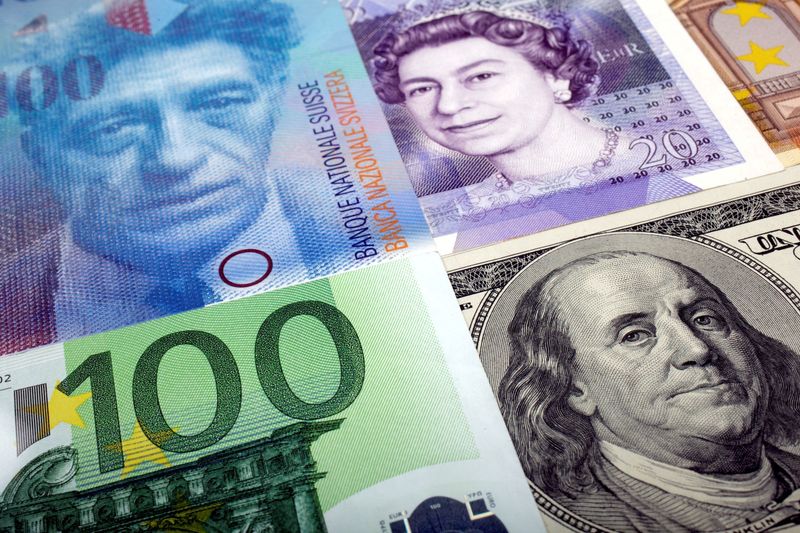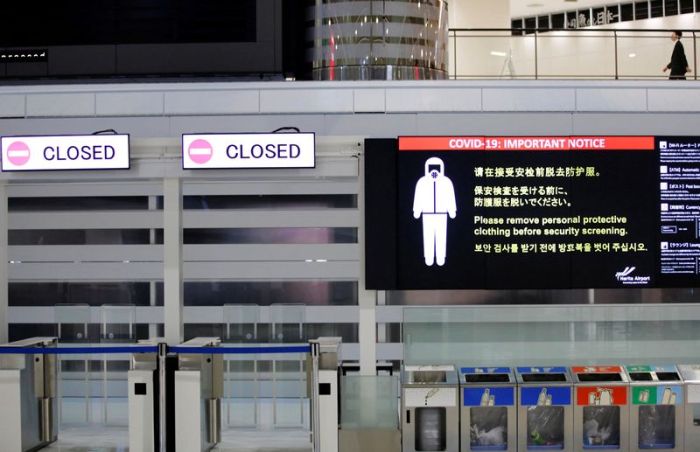NEW YORK (Reuters) – The euro extended recent declines and hit its lowest since 2016 against sterling on Thursday as investors worried about the impact of rising oil prices after Russia’s invasion of Ukraine, while the U.S. dollar index rose as Federal Reserve Chairman Jerome Powell reiterated that he supports a 25-basis-point hike this month.
Powell repeated the comments during his second day of testimony before Congress. The dollar also was supported by weekly U.S. jobless claim data, which suggested the labor market was gaining steam, a day ahead of Friday’s key February U.S. jobs report.
Data showed the number of Americans filing new claims for unemployment benefits dropped to their lowest level this year last week. Economists are anticipating another month of solid job growth in Friday’s jobs report.
The U.S. dollar index was last up 0.4% and hit its highest since June 2020, while the dollar was down slightly against the yen.
“The dollar is in a significant groove right now, benefiting from safe-haven flows and the solid shape of the U.S. economy,” said Joe Manimbo, senior market analyst at Western Union Business Solutions in Washington.
“Certainly the data this week has been really bullish … so if we see strong job growth coupled with oil exacerbating inflation, we think that would keep big Fed rate hikes in the conversation,” he said.
In other U.S. data, new orders for U.S.-made goods increased more than expected in January, pointing to continued strength in manufacturing.
Oil eased after hitting prices not seen in roughly a decade. Sellers jumped on hopes the United States and Iran will agree soon on a nuclear deal that could add barrels to a tight global market. [O/R]
Russia and Ukraine have agreed on the need to set up humanitarian corridors and a possible ceasefire around them for fleeing civilians, both sides said after talks on Thursday, while Russian invasion forces surrounded and bombarded Ukrainian cities as the conflict entered its second week.
“The Ukraine crisis has really lit a fire under oil, and we’re showing how that’s really becoming a source of significant weakness for the euro and a major source of strength for commodity currencies,” Manimbo said.
The euro was down 0.5% at $1.1060 and again reached its lowest since May 2020. It is headed for its fourth straight weekly fall against the U.S. dollar. Against sterling, the euro hit its lowest since July 2016.
Commodity-linked currencies mostly rose. The Australian dollar was up 0.3% against the U.S. dollar.
The Russian rouble was flat by the end the day on the Moscow exchange at 106.01 after hitting an all-time low of 118.35 in thin, volatile trade. The Russian central bank imposed a 30% commission on foreign currency purchases by individuals on currency exchanges – a move brokers said appeared designed to curb demand for dollars.
The U.S. dollar was last up about 12% against the rouble.
========================================================
Currency bid prices at 3:35PM (2035 GMT)
Description RIC Last U.S. Close Pct Change YTD Pct High Bid Low Bid
Previous Change
Session
Dollar index
97.7670 97.4160 +0.37% 2.199% +97.9610 +97.3890
Euro/Dollar
$1.1060 $1.1119 -0.54% +0.00% +$1.1121 +$1.1033
Dollar/Yen
115.4300 115.5200 -0.06% +0.00% +115.8000 +115.3900
Euro/Yen
127.66 128.43 -0.60% +0.00% +128.5000 +127.5900
Dollar/Swiss
0.9188 0.9205 -0.19% +0.00% +0.9216 +0.9180
Sterling/Dollar
$1.3335 $1.3405 -0.51% +0.00% +$1.3417 +$1.3318
Dollar/Canadian
1.2683 1.2631 +0.42% +0.00% +1.2693 +1.2587
Aussie/Dollar
$0.7319 $0.7298 +0.29% +0.00% +$0.7348 +$0.7277
Euro/Swiss
1.0161 1.0231 -0.68% +0.00% +1.0237 +1.0161
Euro/Sterling
0.8291 0.8295 -0.05% +0.00% +0.8300 +0.8276
NZ
Dollar/Dollar $0.6796 $0.6787 +0.18% +0.00% +$0.6809 +$0.6762
Dollar/Norway
8.9190 8.8475 +0.83% +0.00% +8.9400 +8.8705
Euro/Norway
9.8667 9.8402 +0.27% +0.00% +9.8747 +9.8153
Dollar/Sweden
9.7626 9.6765 +0.41% +0.00% +9.7923 +9.6608
Euro/Sweden
10.7977 10.7538 +0.41% +0.00% +10.8116 +10.7470
(Additional reporting by Dhara Ranasinghe in London and Tom Westbrook in Singapore; Editing by Hugh Lawson, Edmund Blair and Jonathan Oatis)

























